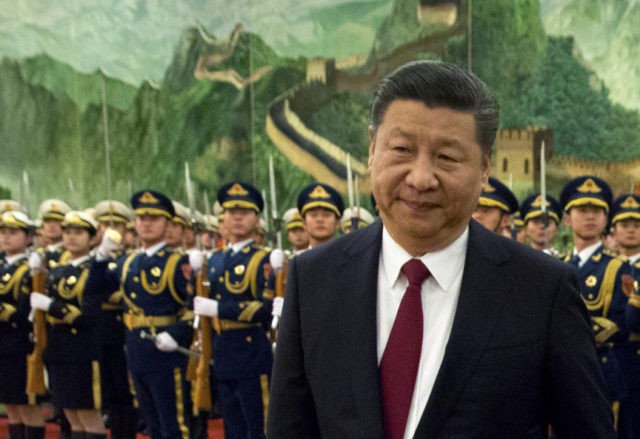Speaking to Reuters on Thursday, analysts and Chinese citizens expressed mounting anxiety about Xi Jinping’s bid for autocratic power.
The idea is that Chinese society accepts authoritarian rule up to a certain point, but expects the state to accept a few limits on power and leave some areas where citizens can act on their own. One commentator described it as the “state-society compact” and suggested the removal of term limits on the presidency was the last straw for more Chinese people than the Communist Party would like to admit.
Reuters summarizes that unspoken Chinese social contract as “stay out of politics and we’ll help you prosper.” The idea is that average Chinese citizens accept that they have very little control over the political elite, but the elite has a corresponding duty to them. This perspective is one reason why allegations of corruption can be so infuriating to the Chinese, and why the political elite hate it when freelance reformers toss around politically inconvenient allegations of corruption.
Reuters intriguingly asserts that “many in China believed that their government would gradually become more liberal and open, not swerve back toward authoritarianism or even to strongman rule.”
This is, of course, the guiding principle of Western foreign policy, a nearly religious faith that engagement with free markets and the wealth of more liberal societies will inexorably liberalize tyrannies. In China’s case, something closer to the reverse is happening, as Western corporations that do business with China are infected by their authoritarian ways and bring their techniques back to America and Europe.
A dash of cold comfort can be taken from knowing that Chinese citizens truly expected their government to loosen up as GDP rose, trade flourished, and the middle class expanded.
“I used to have confidence that our country would become more and more open. I think it’s a very sad thing if this constitutional amendment only lifts term limits but comes without any steps to restrict power,” a university student told Reuters, referring to the amendment that allowed Xi Jinping to become president-for-life.
“There is considerable acquiescence and tolerance for authoritarianism in China, both out of pragmatism but also support for the idea that an uncompromising government is needed to manage a country of China’s size,” Reuters explains. “But the swift undoing of a decades-long institutional check on power, introduced by late paramount leader Deng Xiaoping to prevent the recurrence of one-man rule after Mao Zedong’s death, has prompted concern among many Chinese that the country was lurching backwards.”
Beijing political commentator Wu Qiang told Reuters the liberalization formula went haywire in China because, instead of a rising middle class demanding more freedom and autonomy from the government, China’s “politically apathetic middle class” lost its ability to express dissent and organize for political change.
They now find themselves in a high-tech tyranny where organization is impossible and dissent is dangerous, where the monitors and censors of the state never rest. Even Chinese with the mildest of complaints are terrified of leaving footprints of dissent online. Instead of liberating them, the heavily controlled Chinese internet is teaching them resistance is futile.
Xi has plenty of supporters, but the crucial asset that secures his power is knowing that critics will never be able to connect with each other and begin the kind of preference cascade that truly threatens authoritarian rule.
In the simplest terms, a preference cascade begins when people who feel isolated and alone realize that a surprising number of other citizens agree with them, so their views are not as marginal as they were led to believe. The Chinese Communists have developed impressively effective systems for ensuring that dissidents will always feel isolated, monitored, and surrounded by informants. Even those cynical souls who roll their eyes at pervasive state propaganda are taught that almost everyone else agrees with the propaganda.
This is clearly evident in the remarks of Chinese citizens who worry that Xi’s grab for unlimited power is troubling but mute their criticism because they believe almost everyone else accepts it. China’s vigorous online censorship is intended to keep them feeling this way, using a digital flamethrower to wipe out sarcastic memes and oblique jokes that could snowball into a sense that Xi is not as widely revered as the government claims.
Reuters quotes David Bandurski of the China Media Project saying the incredibly aggressive efforts of China’s speech control army “displays a level of absurdity and paranoia that would seem to suggest China’s leaders themselves understand the criticism is there, and that it is sufficiently intense to be a threat.”
It is important to understand that the Chinese censors are not truly over-reacting when they banish Winnie the Pooh from the web or utterly vaporize a reporter’s digital presence because she rolled her eyes at the softball treatment of a bureaucrat. They have studied how preference cascades work. They know it is important to prevent the masses from getting the idea that laughing at the political elite is acceptable.

COMMENTS
Please let us know if you're having issues with commenting.